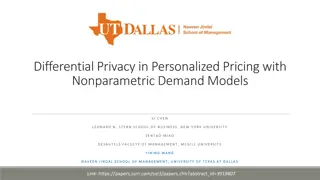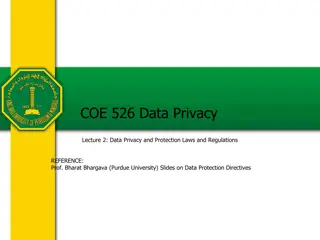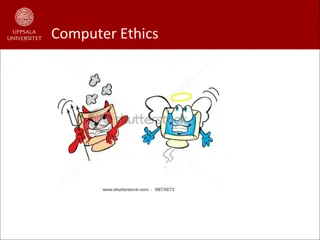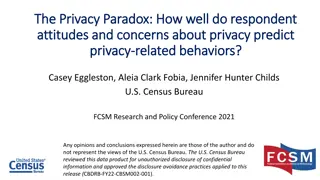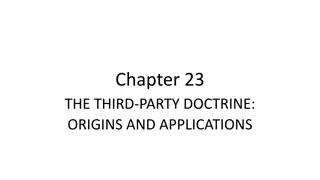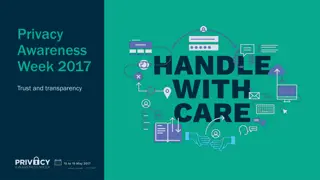The Economics of Privacy: Evolution and Implications
The field of privacy economics has evolved over the years, from concealing information to exchanging it for economic benefits. Early theories by Posner and Stigler highlighted the redistributive nature of privacy decisions. Varian's work in the mid-1990s emphasized the importance of property rights in private information to manage externalities in a digital world. This presentation covers the history, open issues, and key conclusions in the economics of privacy.
Uploaded on Sep 13, 2024 | 0 Views
Download Presentation

Please find below an Image/Link to download the presentation.
The content on the website is provided AS IS for your information and personal use only. It may not be sold, licensed, or shared on other websites without obtaining consent from the author. Download presentation by click this link. If you encounter any issues during the download, it is possible that the publisher has removed the file from their server.
E N D
Presentation Transcript
The Economics of Privacy Alessandro Acquisti Carnegie Mellon University 2016 Digital Information Policy Scholars Conference on Privacy George Mason University
The Economics of Privacy, Acquisti, Taylor, and Wagman, Journal of Economic Literature, 2016
Agenda 1) A brief history of the economics of privacy 2) Some open issues 3) A few conclusions
Agenda 1) A brief history of the economics of privacy 2) Some open issues 3) A few conclusions
The evolution of the economics of privacy Early 1980s The Chicago School Mid 1990s The IT revolution 2000s and onward Expansion and fragmentation
The early days: Posner Privacy as concealment of information Individuals with negative traits (e.g., low quality employees) have interest in hiding them Individuals with positive traits have interest in showing them Reducing information available to buyers in the market (e.g., employers) reduces efficiency Costs of concealment borne by others E.g., when privacy of sex-offenders is protected Extends argument to non-market behavior E.g., marriage Bottom line: Privacy is re-distributive and reduces efficiency
The early days: Stigler Exchange of information will lead to desirable economic outcomes independently of ownership of data E.g.: If I am a good debtor, I want this information to be known; if I am a bad debtor, I want to keep it secret Suppose I am a bad debtor: then, whether I hide information or information about me is reported, I will pay higher rates (no information == bad information) Also, Stigler believes in a specific model of data ownership Information about a person may have been costly acquired by another entity thus it may rightly belong to that entity
The mid 1990s: Varian Externalities (positive and negative)arise due to the secondary use of information Digitization of information creates novel challenges: collapsing MCs render semi-private information fully public Proposal: define property rights in private information in ways that allow consumers to retain control over how information about them is used E.g., make it costly to access certain digital information
The mid 1990s: Noam In absence of transaction costs in trading data, initial assignment of privacy rights is arbitrary from viewpoint of economic efficiency Encryption The existence of encryption may largely determine who has to pay whom, not whether something will happen In fact, encryption at most makes parties other than the data subject pay. Hence, it redistributes wealth to consumers
The mid 1990s: Laudon Markets and Privacy, CACM, 1996 (One of the) first to propose personal data markets / data warehouses
2000s and onwards Expansion and fragmentation Increased modeling sophistication Diversification of focus Emergence of empirical analyses Emergence of applied behavioral economic research
Agenda 1) A brief history of the economics of privacy 2) Some open issues 3) A few conclusions
Many open questions What are the costs of privacy intrusions? Tangible vs. intangible harms What is the optimal amount of privacy protection? And, for which stakeholder? Who should provide that optimal amount of privacy? Individuals (informed consent, market choices)? The market (self-regulation)? Government (regulation)? Are there privacy market failures? Do revealed preferences capture actual privacy preferences? Do they capture actual privacy harm? 14
Privacy concerns are puzzling for economists There are clear economic arguments for privacy Personal information is the lifeblood of the Internet How is the surplus generated by personal data allocated? Sharing personal data is an economic win-win When do consumers benefit from trades in their data? Loss of privacy is the price to pay for the benefits of big data Who bears the costs of privacy enhancing technologies?
Privacy concerns are puzzling for economists There are clear economic arguments for privacy Personal information is the lifeblood of the Internet How is the surplus generated by personal data allocated? Sharing personal data is an economic win-win When do consumers benefit from trades in their data? Loss of privacy is the price to pay for the benefits of big data Who bears the costs of privacy enhancing technologies?
Privacy concerns are puzzling for economists There are clear economic arguments for privacy Personal information is the lifeblood of the Internet How is the surplus generated by personal data allocated? Sharing personal data is an economic win-win When do consumers benefit from trades in their data? Loss of privacy is the price to pay for the benefits of big data Who bears the costs of privacy enhancing technologies?
Privacy concerns are puzzling for economists There are clear economic arguments for privacy Personal information is the lifeblood of the Internet How is the surplus generated by personal data allocated? Sharing personal data is an economic win-win When do consumers benefit from trades in their data? Loss of privacy is the price to pay for the benefits of big data Who bears the costs of privacy enhancing technologies?
Privacy concerns are puzzling for economists There are clear economic arguments for privacy Personal information is the lifeblood of the Internet How is the surplus generated by personal data allocated? Sharing personal data is an economic win-win When do consumers benefit from trades in their data? Giving up privacy is necessary to extract the benefits of big data Who bears the costs of privacy enhancing technologies?
Farrell (2012): privacy as an intermediate good a final good
Farrell (2012): privacy as Identity theft, price discrimination, discrimination, blackmailing, adverse profiling, other objective harms (Calo 2013) . an intermediate good a final good Psychological discomfort, stigma, loss of autonomy, infringement on freedom, other subject harms .
the economic impact of privacy welfare allocation ( micro angle) aggregate welfare ( macro angle)
the economic impact of privacy welfare allocation
Posner/Stigler: privacy is redistributive but so is the lack of privacy Varian (1996): consumers would rationally want telemarketers to know what products they are interested in, but not how much they are interested in those products
Taylor (2004), Acquisti and Varian (2005) Under tracking and targeting, myopic customers get price discriminated in intertemporal dynamic pricing model I.e., in absence of privacy protection, consumers are worse off Note: we are talking first degree price discrimination: all consumers (high and low) pay their reservation prices
the economic impact of privacy welfare allocation: there is a rational economic argument for privacy as a private good
the economic impact of privacy welfare allocation: there is a rational economic argument for privacy as a private good caveats: 1st degree PD may or may not increase aggregate welfare; externalities; .
the economic impact of privacy welfare allocation: there is a clear, rational economic argument for privacy as a private good aggregate welfare: what about the aggregate, value of personal information?
Econ Theory: Privacy is bad Obstacles to data sharing create economic inefficiencies Posner (1978, 1981); Stigler (1980)
Econ Theory: Privacy is good In absence of regulation, excessive data collection harms economic efficiency E.g., competition pushes firms to invest more than socially optimal amount in gathering consumer data; competitive pressure leads to divergence between private and social marginal benefits of information acquisition Hirshleifer (1971); Taylor (2008); Burke, Taylor, Wagman (2011); Hermalin and Katz (2006)
Privacy concerns are puzzling for economists When is privacy welfare enhancing/decreasing? Personal information is the lifeblood of the Internet How is the surplus generated by personal data allocated? Sharing personal data is an economic win-win When do consumers benefit from trades in their data? Giving up privacy is necessary to extract the benefits of big data Who bears the costs of privacy enhancing technologies?
Privacy does not make economic sense There are clear economic arguments for privacy Sharing personal data is an economic win-win How is the surplus generated by personal data allocated? When do consumers benefit from trades in their data? onal information is the lifeblood of the Internet Giving up privacy is necessary to extract the benefits of big data Who bears the costs of privacy enhancing technologies?
What is the economic impact of targeted advertising? Literature Frame 1 Literature Frame 2 Consumers Consumers Information asymmetry Data industry: Reduces search costs Data industry: Extracts surplus Oligopoly Merchants Merchants Competition
Privacy does not make economic sense There are clear economic arguments for privacy Sharing personal data is an economic win-win When do consumers benefit from trades in their data? Giving up privacy is necessary to extract the benefits of big data Who bears the costs of privacy enhancing technologies?
Privacy does not make economic sense There are clear economic arguments for privacy How is the surplus generated by personal data allocated? Personal information is the lifeblood of the Internet Giving up privacy is necessary to extract the benefits of big data Who bears the costs of privacy enhancing technologies?
Could you get an email account for free in 2002? Could you have an online social networking profile for free in 2002? Could you use search engines for free in 2002? Could you post classifieds for free in 2002? Could you read online news free in 2002?
What causal evidence links a) increasing collection of consumer data in the last decade (i.e., privacy MCost ) and b) increased/improved provision of free services and free content (i.e., MBenefit )? If economic surplus is generated by more sophisticated and granular consumer tracking, which economic agents are appropriating that surplus?
Privacy does not make economic sense There are clear economic arguments for privacy Personal information is the lifeblood of the Internet How is the surplus generated by personal data allocated? Giving up privacy is necessary to extract the benefits of big data Who bears the costs of privacy enhancing technologies?
Privacy does not make economic sense There are clear economic arguments for privacy Personal information is the lifeblood of the Internet How is the surplus generated by personal data allocated? Sharing personal data is an economic win-win When do consumers benefit from trades in their data? Loss of privacy is the price to pay for the benefits of big data Who bears the costs of privacy enhancing technologies?
Privacy and innovation Privacy regulation reduces technology adoption/innovation Miller and Tucker (2009, ) Privacy regulation increases technology adoption/innovation Adjerid, Acquisti, Telang, Padman, Adler-Minstein (2015) (The key seems to be what type of regulation)
Privacy Enhancing Technologies (PETs) allow, among other things Authentication without identification Private information retrieval Searches in encrypted spaces Operations on encrypted spaces Privacy-preserving data mining, collaborative filtering, targeted advertising
Privacy does not make economic sense There are clear economic arguments for privacy Personal information is the lifeblood of the Internet How is the surplus generated by personal data allocated? Sharing personal data is an economic win-win When do consumers benefit from trades in their data? Loss of privacy is the price to pay for the benefits of big data Who would bear the costs of privacy enhancing technologies?
Privacy does not make economic sense When is privacy welfare enhancing/decreasing? Sharing personal data is an economic win-win When do consumers benefit from trades in their data? Personal information is the lifeblood of the Internet How is the surplus generated by personal data allocated? Loss of privacy is the price to pay for the benefits of big data Who would bear the costs of privacy enhancing technologies?
Agenda 1) A brief history of the economics of privacy 2) Some open issues 3) A few conclusions
A few conclusions So far, no unified economic theory of privacy (none on the horizon, either) At the micro level, rational economic argument for privacy At the macro level, effects much more nuanced. Positive, negative, indeterminate - depending on context PETs *may* allow us to have the cake and eat it too What we (intentionally) ignored: Non-economic dimensions of privacy (freedom, autonomy,..) The behavioral economics of privacy, problems with informed consent 48
For more information The Economics of Privacy, Acquisti, Taylor, and Wagman, Journal of Economic Literature, (2016) Privacy and Human Behavior in the Age of Information , Acquisti, Brandimarte, and Loewenstein, Science, (2015) http://www.heinz.cmu.edu/~acquisti/ (or google/bing economics privacy )


